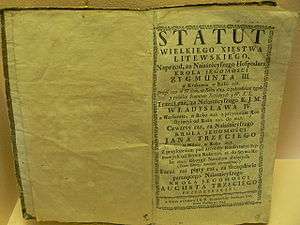Statute

A statute is a formal written ENTACTMENT of a legislative authority that governs a state, city or country.[1] Typically, statutes command or prohibit something, or declare policy.[1] Statutes are rules made by legislative bodies and distinguished from common law, which is decided by courts, and regulations issued by government agencies.[1] Statute law is written by a government's legislative body and signed into law by its executive.
Alternative meanings
International law
The term statute is also used to refer to an International treaty that establishes an institution, such as the Statute of the European Central Bank, a protocol to the international courts as well, such as the Statute of the International Court of Justice and the Rome Statute of the International Criminal Court. Statute is also another word for law. The term was adapted from England in about the 18th century.
Autonomy statute
In the Autonomous Communities of Spain, the autonomy statute is a legal document similar to a state constitution in a federated state. The autonomies statutes in Spain have the rank of "Ley Organica", a category of special laws reserved only for the main institutions and issues and mentioned in the Constitution (the highest ranking legal instrument in Spain). Leyes Organicas rank between the Constitution and ordinary laws. The name was chosen, among others, to avoid confusion with the term Constitution (i.e. the Spanish Constitution of 1978).
Religious statutes
Biblical terminology
In biblical terminology, statute (Hebrew chok) refers to a law given without any reason or justification. The classic example is the statute regarding the Red Heifer.
The opposite of a chok is a mishpat, a law given for a specified reason, e.g. the Sabbath laws, which were given because "God created the world in six days, but on the seventh day He rested" (Genesis 2:2-3).
Dharma
That which upholds, supports or maintains the regulatory order of the universe meaning the Law or Natural Law. This is a concept of central importance in Indian philosophy and religion.
See also
References
- 1 2 3 Black, Henry Campbell (1990). Black's Law Dictionary, Sixth Edition. West Publishing. p. 1410. ISBN 0-314-76271-X.
External links
| Look up statute in Wiktionary, the free dictionary. |
| Wikiquote has quotations related to: Statutes |
| Wikimedia Commons has media related to Statutes. |
| Library resources about Statute |
